
Яницкая Л. К. Английский в дипломатии и политике. Часть 1 (II)
.pdf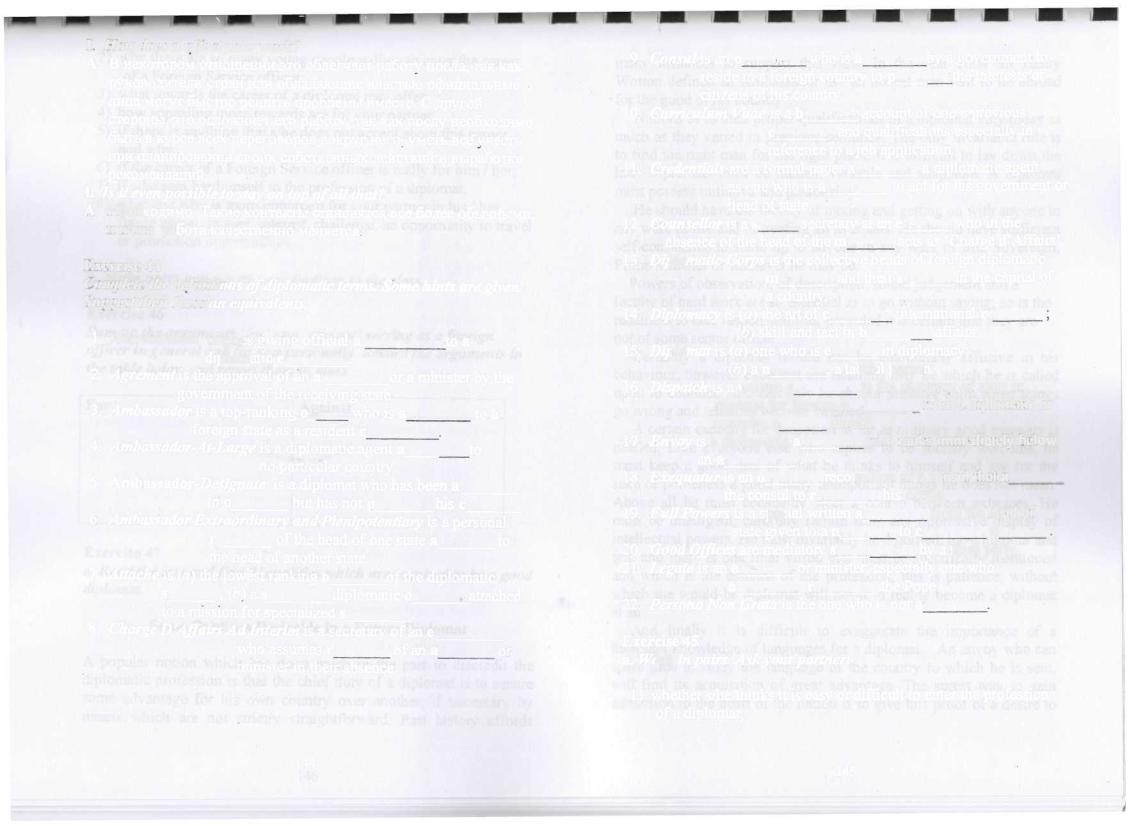
I How does it affect your work?
А.В некотором отношении это облегчает работу посла, так как руководители стран или обладающие властью официальные лица могут быстро решить проблемы вместе. С другой стороны, это осложняет его работу, так как послу необходимо быть в курсе всех переговоров вокруг него, уметь все учесть при планировании своих собственных действий и выработки рекомендаций.
L Is it even possible to stay on top of all thai?
А.Необходимо. Такие контакты становятся все более обычными,
инаша работа качественно меняется
Exercise 44
( ЪтрШе the definitions of diplomatic terms. Some hints are given. Suggest their Russian equivalents.
1. |
Accreditation |
implies giving official |
|
a |
|
|
|
|
|
|
|
to a |
||||||||||||||||
|
|
|
diplomatic e |
|
|
|
|
|
, |
|
|
|
|
|
|
|
|
|
||||||||||
|
|
|
|
|
|
|
|
|
|
|
|
|
|
|
|
|
|
|
|
|
|
|
||||||
|
|
|
|
|
|
|
|
|
|
|
|
|
|
|
|
|
|
|
|
|
|
|
|
|
|
|||
2. Agrement is the approval of an a |
|
|
|
|
|
|
|
or a minister by the |
||||||||||||||||||||
|
|
government of the receiving state. |
|
|
|
|
|
|
|
|
||||||||||||||||||
3. |
Ambassador is a top-ranking o_ |
|
who is a |
|
|
|
|
to a |
||||||||||||||||||||
|
|
foreign state as a resident r |
|
|
|
|
|
|
|
|
|
|
|
|
|
|||||||||||||
4. |
Ambassador-At-Large is a diplomatic agent a |
|
|
|
|
|
|
|
to |
|||||||||||||||||||
|
|
|
|
|
|
|
||||||||||||||||||||||
|
|
|
|
|
|
no particular country. |
|
|
|
|
|
|
|
|
||||||||||||||
5. |
Amb&ssudQY-Designate is a diplomat who has been a |
|
|
|
|
|
||||||||||||||||||||||
|
|
|
to о |
|
but has not p |
|
|
|
|
|
|
his с |
. |
|||||||||||||||
|
|
|
|
|
|
|
|
|
|
|
|
|
|
|
|
|
|
|
|
|
||||||||
6. |
Ambassador Extraordinary and Plenipotentiary is a personal |
|||||||||||||||||||||||||||
|
|
|
r of the |
head of |
|
one |
state |
a |
to |
|||||||||||||||||||
|
|
|
|
|
|
|
|
|
|
|
|
|
|
|
|
|
|
|
|
|
|
|
|
|||||
|
|
|
the head of another state. |
|
|
|
|
|
|
|
|
|
|
|
|
|
||||||||||||
7. |
Attache is (a) the lowest ranking о |
|
|
of |
the |
diplomatic |
||||||||||||||||||||||
|
s |
|
|
; (b) a s |
|
|
|
diplomatic о |
|
|
|
|
attached |
|||||||||||||||
|
|
|
|
|
|
|
|
|
|
|
|
|
|
|
|
|
|
|
|
|||||||||
|
to a mission for specialized s |
|
|
|
|
. |
|
|
|
|
|
|
|
|
||||||||||||||
8. Charge D 'Affairs Ad Interim is a secretary of an e |
|
|
|
|
|
|||||||||||||||||||||||
|
|
|
|
|
|
who assumes r |
|
|
|
|
of an a |
|
or |
|||||||||||||||
|
|
|
|
|
|
minister in their absence. |
|
|
|
|
|
|||||||||||||||||
|
|
|
|
|
|
|
|
|
|
|
|
|
|
|||||||||||||||
144
9. Consul is an о |
|
|
|
|
who is a |
by a government to |
|||||||||||||||||||||||||||||
|
reside in a foreign country to p |
|
the interests of |
||||||||||||||||||||||||||||||||
|
citizens of his country. |
|
|
|
|
|
|
|
|
|
|
|
|
|
|
|
|||||||||||||||||||
10. |
Curriculum Vitae is a b |
|
|
account of one's previous |
|||||||||||||||||||||||||||||||
|
|
|
|
|
|
|
|
|
|
|
|
|
|
|
|
|
|
|
|
|
|
|
|
|
|
|
|
|
|
|
|
||||
|
|
|
|
с |
|
|
|
|
|
|
|
|
|
|
|
|
and qualifications especially in |
||||||||||||||||||
|
|
|
|
reference to a job application. |
|||||||||||||||||||||||||||||||
11. |
Credentials are a formal paper a |
|
|
|
|
|
|
|
|
|
|
|
a diplomatic agent |
||||||||||||||||||||||
|
|
as one who is a |
|
|
|
|
|
|
|
to act for his government or |
|||||||||||||||||||||||||
|
|
head of state. |
|
|
|
|
|
|
|
|
|
|
|
|
|
|
|
|
|||||||||||||||||
12. |
Counsellor is a s |
secretary at an e |
|
|
|
|
who in the |
||||||||||||||||||||||||||||
|
absence of the head of the m |
|
|
|
|
|
|
|
|
acts as 'Charge d'Affairs'. |
|||||||||||||||||||||||||
13. |
Diplomatic Corps is the collective heads of foreign diplomatic |
||||||||||||||||||||||||||||||||||
|
|
|
|
m |
|
|
|
|
|
|
|
|
|
|
and their s |
|
in the capital of |
||||||||||||||||||
|
|
|
|
|
|
|
|
|
|
|
|
|
|
|
|
|
|
|
|
|
|
|
|
|
|
|
|
|
|
|
|
|
|||
|
|
|
|
a country. |
|
|
|
|
|
|
|
|
|
|
|
|
|
|
|
||||||||||||||||
14. Diplomacy is (a) the art of с |
|
|
|
|
|
|
|
|
|
international r_ |
|||||||||||||||||||||||||
|
|
(b) skill and tact in h |
|
affairs. |
|||||||||||||||||||||||||||||||
|
|
|
|
|
|
|
|
|
|
|
|
|
|
|
|
|
|
|
|
|
|
|
|
||||||||||||
15. |
Diplomat is (a) one who is e |
|
|
|
|
|
|
in diplomacy; |
|||||||||||||||||||||||||||
|
|
ф) a n |
|
|
|
|
|
|
|
; a tactful person. |
|||||||||||||||||||||||||
|
|
|
|
|
|
|
|
|
|
|
|
|
|
|
|
|
|
|
|
to the secretary of state or |
|||||||||||||||
16. |
Dispatch is a written с |
|
|
|
|
|
|
|
|
|
|
|
|
|
|
||||||||||||||||||||
|
minister for foreign a |
|
|
|
|
|
|
|
|
|
|
|
|
from a diplomatic or |
|||||||||||||||||||||
|
|
|
|
|
|
|
|
|
|
|
|
|
|
|
|
|
|
|
|
|
|
|
|
|
|
|
|
|
|
|
|
|
|
|
|
|
consular о |
|
|
|
|
|
|
abroad. |
|
|
|
||||||||||||||||||||||||
17. |
Envoy is a diplomatic a |
|
|
|
|
|
who ranks immediately below |
||||||||||||||||||||||||||||
|
an a |
|
. |
|
|
|
|
|
|
|
|
|
|
|
|
|
|
|
|
|
|
|
|
|
|
|
|
|
|||||||
18. |
Exequatur is an о |
|
|
|
|
|
|
recognition of a consul that a |
|||||||||||||||||||||||||||
|
|
|
|
|
|
|
|
|
|
|
|
|
|
|
|
|
|
||||||||||||||||||
|
|
the consul to r |
|
|
|
|
|
|
his office. |
||||||||||||||||||||||||||
|
|
|
|
|
|
|
|
|
|
|
|
|
|
|
|
from the head of |
|||||||||||||||||||
19. |
Full Powers is a special |
|
|
|
written |
a_ |
|
||||||||||||||||||||||||||||
|
|
state given to a n |
|
|
|
|
|
|
|
|
|
to с |
|
|
n |
||||||||||||||||||||
|
|
|
|
|
|
|
|
|
|
|
|
|
|||||||||||||||||||||||
20. |
Good Offices are mediatory s |
|
|
|
|
|
|
|
|
|
|
|
by a third party. |
||||||||||||||||||||||
21. |
Legate is an e |
or minister, especially one who |
|||||||||||||||||||||||||||||||||
|
|
о |
|
|
|
|
|
r |
|
|
|
|
|
the Pope. |
|||||||||||||||||||||
|
|
|
|
|
|
|
|
|
|
|
|
|
|
|
|
|
|
|
|
|
|
|
|
|
|
|
|
|
|
|
|
|
|
|
|
22. Persona Non Grata is the one who is not a
Exercise 45
a.Work in pairs. Ask your partner:
1)whether s/he thinks it is easy or difficult to enter the profession of a diplomat;
145
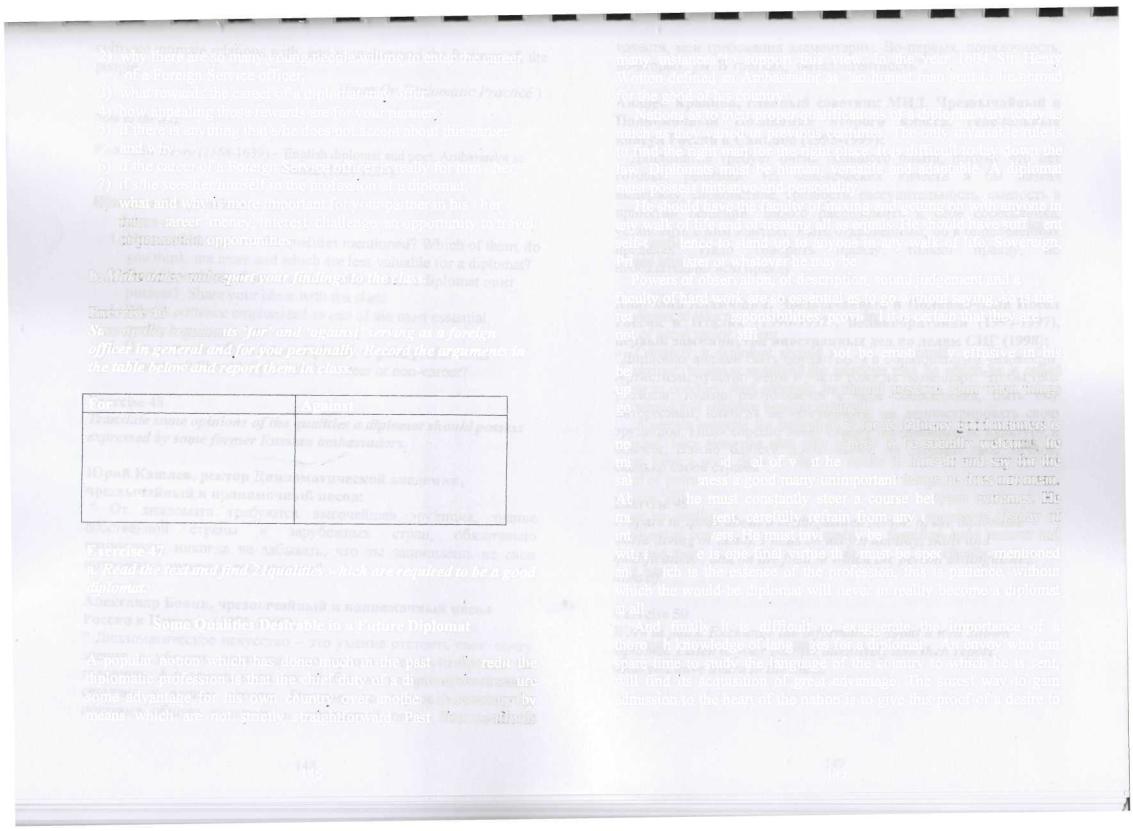
2)why there are so many young people willing to enter the career of a Foreign Service officer;
3)what rewards the career of a diplomat may offer;
4)how appealing those rewards are for your partner;
5)if there is anything that s/he does not accept about this career and why;
6) |
if the career of a Foreign Sendee officer is really for him / her; |
7) |
if s/he sees her/himself in the profession of a diplomat; |
8)what and why is more important for your partner in his / her future career: money, interest, challenge, an opportunity to travel
ОГ promotion opportunities.
b. Make notes and report your findings to the class.
Exercise 46
Sum up the arguments 'for' and 'against3 sending as a foreign officer in general and for you personally. Record the arguments in the table below and report them in class.
For |
Against |
Exercise 47
a. Read the text and find 21 qualities which are required to be a good diplomat
Some Qualities Desirable in a Future Diplomat
A popular notion which has done much in the past to discredit the diplomatic profession is that the chief duty of a diplomat is to secure some advantage for his own country over another, if necessary by means which are not strictly straightforward. Past history a (fords
many instances to support this view. In the year 1604 Sir Henry Wotton defined an Ambassador as ccan honest man sent to lie abroad for the good of his country'".
Nations as to their proper qualifications of a diplomat vary today as much as they varied in previous centuries. The only invariable rule is to find the right man for the right place. It is difficult to lay down the law. Diplomats must be human, versatile and adaptable. A diplomat must possess initiative and personality.
He should have the faculty7 of mixing and getting on with anyone in any walk of life and of treating all as equals. He should have sufficient self-confidence to stand up to anyone in any walk of life, Sovereign, Prime Minister or whatever he may be.
Powers of observation, of description, sound judgement and a faculty of hard work are so essential as to go without saying; so is the readiness to take responsibilities, provided it is certain that they are not of some senior officer
Certainly a diplomat should not be emotionally effusive in his behaviour, however excellent the relations may be which he is called upon to conduct. And certainly he should preserve calm when things go wrong and relations become strained.
A certain capacity for deception as far as ordinary usn^l manners is needed. Like everyone else who aspires to be socially welcome, he must keep a good deal of what he thinks to himself and say for the sake of politeness a good many unimportant things he does not mean Above all he must constantly steer a course between extremes. 11c must be intelligent, carefully refrain from any oppressive display of intellectual powers. He must invariably be dignified, have humour and wit, and there is one final virtue that must be specifically mentioned and which is the essence of the profession, this is patience, without which the would-be diplomat will never in reality become a diplomat at all.
And finally it is difficult to exaggerate the importance of a thorough knowledge of languages for a diplomat. An envoy who can spare time to study the language of the country to which he is sent, will find its acquisition of great advantage. The surest way to gain admission to the heart of the nation is to give this proof of a desire to
146 |
1/17 |
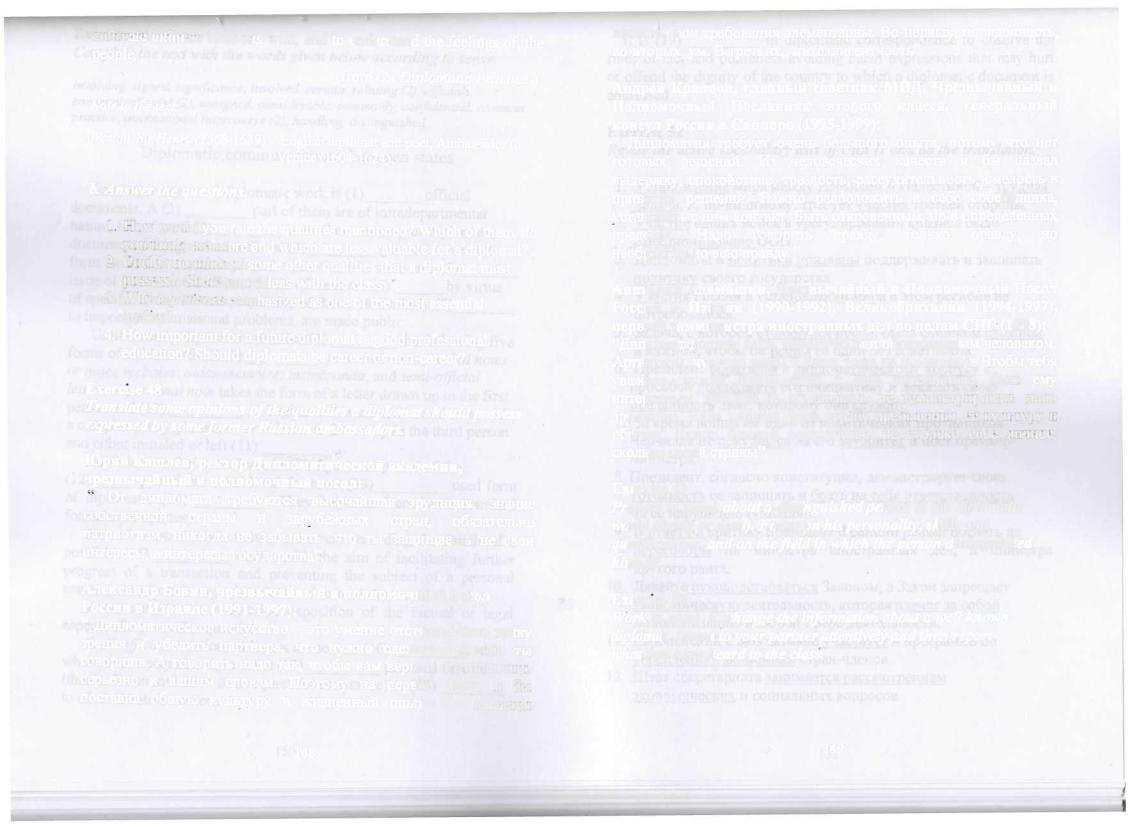
cultivate intimate relations with, and to understand the feelings of, the people.
(from On Diplomatic Practice )
Note to the text:
Wotton, Sir Нету (1568А639) - English diplomat and poet, Ambassador to Venice (1604-1624).
b. Answer the questions.
I I low would you rate the qualities mentioned? Which of them, do you think, are more and which are less valuable for a diplomat?
2.Could you think of some other qualities that a diplomat must possess? Share your ideas with the class.
3.Why is patience emphasized as one of the most essential quality?
4.How important for a future diplomat is good professional education? Should diplomats be career or non-career?
Exercise 48
Translate some opinions of the qualities a diplomat should possess expressed by some former Russian ambassadors,
Юрий Кашле», ректор Дипломатической академии, чрезвычайный и полномочный посол:
От дипломата требуются высочайшая эрудиция, знание собственной страны и зарубежных стран, обязательно патриотизм, никогда не забывать, что ты защищаешь не свои интересы, а интересы государства".
Александр Бовин? чрезвычайный и полномочный посол России в Израиле (1991-1997):
" Дипломатическое искусство - это умение отстоять свою точку зрения и убедить партнера, что нужно сделать так, как ты говоришь. А говорить надо так, чтобы вам верили и относились серьезно к вашим словам. Поэтому на первое место я бы поставил общую культуру и жизненный опыт. Что касается
148
качеств, мои требования элементарны. Во-первых, порядочность, во-вторых, ум. В третьих, интеллигентность".
Андрей Кравцов, главный советник МИД, Чрезвычайный и Полномочный Посланник второго класса, генеральный консул России в Саппоро (1995-1999):
" Дипломатия требует очень большого опыта, потому что нет готовых решений. Из человеческих качеств я бы назвал выдержку, спокойствие, трезвость, рассудительность, смелость в принятии решений. Важно расположить к себе собеседника, установить с ним контакт. Быть откровенным, но в определенных пределах. Надо говорить правду, только правду, но необязательно всю правду ".
Анатолий Адамищин, Чрезвычайный и Полномочный Посол России в Италии (1990-1992), Великобритании (1994-1997), первый замминистра иностранных лел по делам СНГ (1998):
"Дипломат должен быть порядочным и образованным человеком. Артистизм, чувство меры и такта тоже не помешают. Чтобы тебя уважали, нужно расположить к себе собеседника, быть ему интересным, никогда не обманывать, не демонстрировать свою эрудицию. Надо хорошо знать страну пребывания, ее культуру и обычаи. Важно блюсти достоинство, не столько свое личное, сколько своей страны".
Exercise 49
Prepare to speak about a distinguished person in the diplomatic world (living or dead). Focus on his personality, skills and qualifications, and on the field in which the person distinguished himself
Exercise 50
Work in pairs. Exchange the information about a well known diplomat Listen to your partner attentively and then report what you have heard to the class.
149
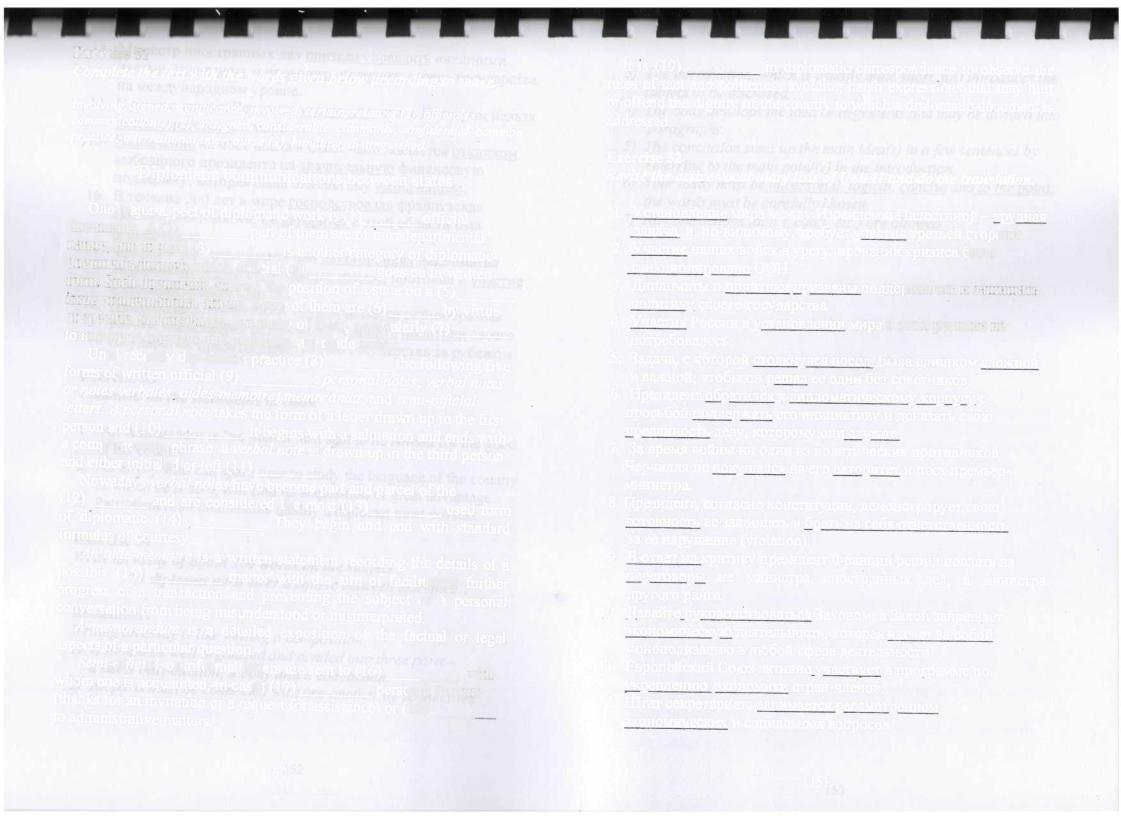
Exercise 51
Complete the text with the words given below according to sense.
Involving, signed, significance, involved, certain, relating (2), officials, communication(s) (2), unsigned, considerable, commonly, confidential, common practice, international intercourse (2), handling, distinguished.
|
|
|
D i p l o m a t i c |
c o m m u n i c a t i o n s b e t w e e n |
states |
|
|
||||||||||||||||||||||||||||||||
|
One major aspect of diplomatic work is (1) |
|
|
|
|
|
|
|
|
|
official |
||||||||||||||||||||||||||||
documents. A (2) |
|
|
|
|
|
|
|
|
|
part of them are of mtradepartmental |
|||||||||||||||||||||||||||||
nature, |
but of great |
(3) |
|
|
|
|
|
|
|
|
|
is another category of diplomatic |
|||||||||||||||||||||||||||
documents through which official (4) |
|
|
goes on in written |
||||||||||||||||||||||||||||||||||||
form |
|
|
|
|
|
|
|
|
|
|
|
|
|
|
|
|
|
|
|
|
|
|
|
|
|
|
|||||||||||||
Such documents express the position of a state on a (5) |
|
|
|
||||||||||||||||||||||||||||||||||||
issue |
of |
international |
|
affairs. Some |
of them are |
(6) |
|
|
|
|
|
by virtue |
|||||||||||||||||||||||||||
of specific circumstances, |
but many of them, particularly (7) _ _ _ _ _ _ |
||||||||||||||||||||||||||||||||||||||
to important international problems, are made public. |
|
|
|
|
|
|
|
|
|
||||||||||||||||||||||||||||||
|
Until recently diplomatic practice (8) |
|
|
|
|
|
the following five |
||||||||||||||||||||||||||||||||
|
|
|
|
|
|
|
|
|
|
|
|
|
|
|
|
|
|
|
|
|
|
|
|
||||||||||||||||
forms of written official (9) |
|
|
|
|
|
|
: personal notes', verbal notes |
||||||||||||||||||||||||||||||||
|
|
|
|
|
|
|
|
|
|
|
|
|
|
|
|
|
|
|
|
|
|
|
|||||||||||||||||
or notes |
verb ales: |
aides-memoir e; |
memoranda, |
|
and |
semi-official |
|||||||||||||||||||||||||||||||||
letters. |
A personal note |
|
takes the form of a letter |
drawn up in the first |
|||||||||||||||||||||||||||||||||||
person and (10) _____ |
|
|
|
|
, it begins with a salutation and ends with |
||||||||||||||||||||||||||||||||||
a complimentary phrase; |
a verbal note is drawn |
up in the third person |
|||||||||||||||||||||||||||||||||||||
and either initialed or left (11) |
|
|
. |
|
|
|
|
|
|
|
|
|
|
|
|
|
|
|
|
|
|||||||||||||||||||
Nowadays verbal notes have become part and parcel |
of the |
|
|
||||||||||||||||||||||||||||||||||||
(12) |
|
|
|
|
and are considered the most (13) |
|
|
|
|
|
|
used form |
|||||||||||||||||||||||||||
of diplomatic (14) . |
. |
They begin |
and end |
with |
|
standard |
|||||||||||||||||||||||||||||||||
formulas |
of courtesy. |
|
|
|
|
|
|
|
|
|
|
|
|
|
|
|
|
|
|
|
|
|
|
|
|
|
|
|
|
|
|
|
|||||||
An aide-memoire is a written statement recording the details of a |
|||||||||||||||||||||||||||||||||||||||
possibly |
(15) |
|
|
|
|
|
|
|
matter with the aim of facilitating |
further |
|||||||||||||||||||||||||||||
progress of a transaction and preventing the |
|
subject |
of a |
|
personal |
||||||||||||||||||||||||||||||||||
conversation from being misunderstood or misinterpreted. |
|
|
|
|
|
||||||||||||||||||||||||||||||||||
A memorandum is a detailed exposition of |
|
the |
factual |
or |
|
legal |
|||||||||||||||||||||||||||||||||
aspects |
of a particular question. |
|
|
|
|
|
|
|
|
|
|
|
|
|
|
|
|
|
|
|
|
|
|
|
|||||||||||||||
Semi-official, or informal letters are sent to (16) |
|
|
|
|
|
|
|
, with |
|||||||||||||||||||||||||||||||
|
|
|
|
|
|
|
|
|
|||||||||||||||||||||||||||||||
whom one is acquainted, in cases (17) |
|
|
|
|
personal favours |
||||||||||||||||||||||||||||||||||
|
|
|
|
|
|
|
|
|
|||||||||||||||||||||||||||||||
(thanks for an invitation or a request for assistance) or (18) |
|
|
|
|
|
||||||||||||||||||||||||||||||||||
to administrative matters. |
|
|
|
|
|
|
|
|
|
|
|
|
|
|
|
|
|
|
|
|
|
|
|
|
|
|
|
|
|
|
|||||||||
|
|
|
|
|
|
|
|
|
|
150 |
|
|
|
|
|
|
|
|
|
|
|
|
|
|
|
|
|
|
|
|
|
|
|||||||
in diplomatic correspondence to observe the rules of tact and politeness avoiding harsh expressions that may hurt or offend the dignity of the country to which a diplomatic document is addressed.
Exercise 52
Revise the active vocabulary lists of Unit II and do the translation.
1.Установление мира между Израилем и Палестиной - трудная задача, и, по-видимОхму, требует участия третьей стороны.
2.Участие наших войск в урегулировании кризиса было санкционировано ООН.
3.Дипломаты и политики призваны поддерживать и защищать политику своего государства.
4.Участия России в установлении мира в этом регионе не потребовалось.
5.Задача, с которой столкнулся посол, была слишком сложной
иважной, чтобы он решал ее один без советников.
6.Президент обратился к дипломатическому корпусу с просьбой поддержать его инициативу и доказать свою преданность делу, которому они служат.
7.За время войны ни один из политических противников Черчилля не покушался на его авторитет и пост премьерминистра.
8.Президент, согласно конституции, демонстрирует свою готовность ее защищать и брать на себя ответственность за ее нарушение (violation).
9.В ответ на критику президент Франции решил послать на переговоры не министра иностранных дел, а министра другого ранга.
10.Давайте руководствоваться Законом, а Закон запрещает экономическую деятельность, которая влечет за собой монополизацию в любой сфере деятельности.
11.Европейский Союз активно участвует в программе по укреплению экономики стран-членов.
12.Штат секретариата занимается рассмотрением экономических и социальных вопросов.
151
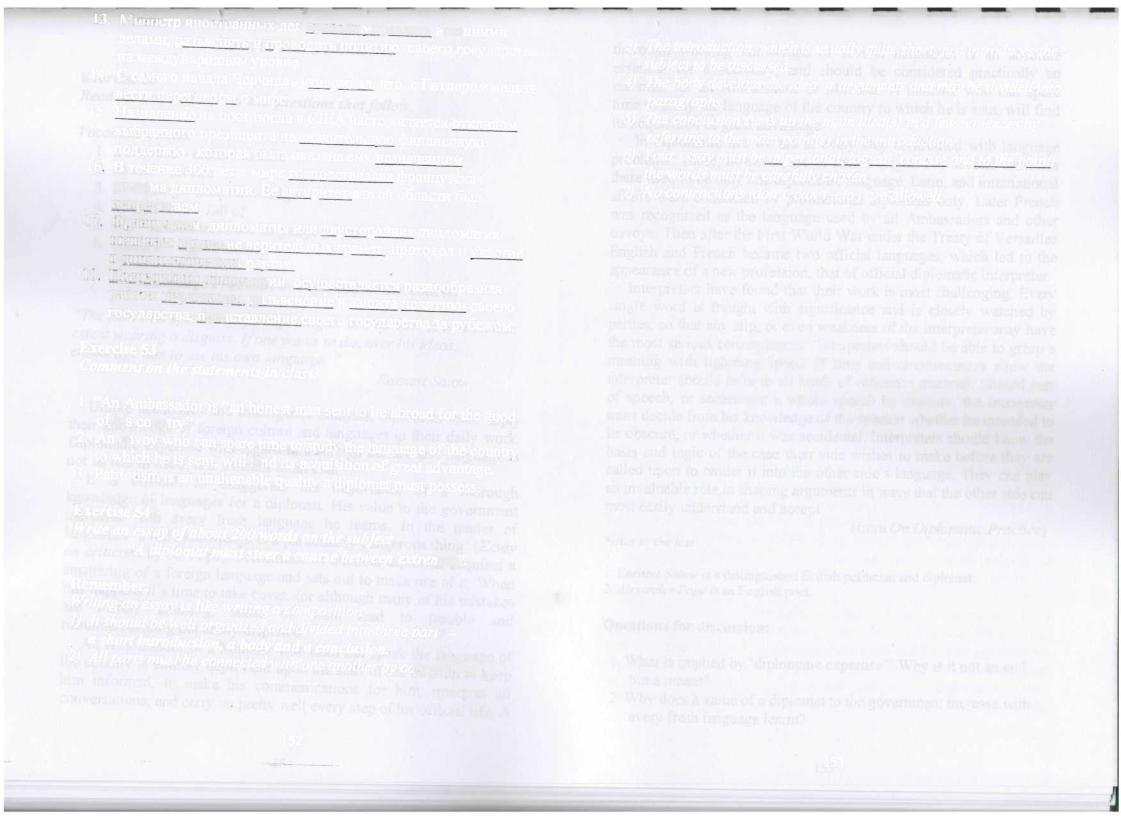
13. Министр иностранных дел призван управлять внешними делами, разъяснять и проводить политику своего государства на международном уровне.
14. С самого начала Черчилль утверждал, что с Гитлером нельзя вести переговоры о мире.
15.Назначение на пост посла в США часто является откликом выбранного президента на значительную финансовую поддержку, которая была оказана ему назначенцем.
16 В течение 300 лет в мире гослодствовапа французская система дипломатии. Ее авторитет в этой области был непререкаем.
17Французская дипломатия или двусторонняя дипломатия включает вручение верительных грамот, протокол и участие и дипломатических раутах.
18 1^средством дипломатии осуществляется разнообразная работа: переговоры, разъяснение и защита политики своего государства, представление своего государства за рубежом.
Exercise 53
Comment on the statements in class.
1."An Ambassador is "an honest man sent to lie abroad for the good of his country".
2.An envoy who can spare time to study the language of the country
to which he is sent, will find its acquisition of great advantage. 3. Patriotism is an unalienable quality a diplomat must possess.
Exercise 54
Write an essay of about 200 words on the subject
"A diplomat must steer a course between extremes".
Remember:
Writing an essay is like writing a composition:
1) It should be well organized and divided into three parts - a short introduction, a body and a conclusion.
2) All parts must be connected with one another by connectives.
152
3)The introduction, which is usually quite short, just introduces the subject to be discussed.
4)The body develops the idea or arguments and may be divided into paragraphs.
5)The conclusion sums up the main idea(s) in a few sentences by referring to the main point(s) in the introduction.
6)Your essay must be impersonal logical concise and to the point; the words must be carefully chosen.
7)No contractions (don% can % etc.) are allowed.
153
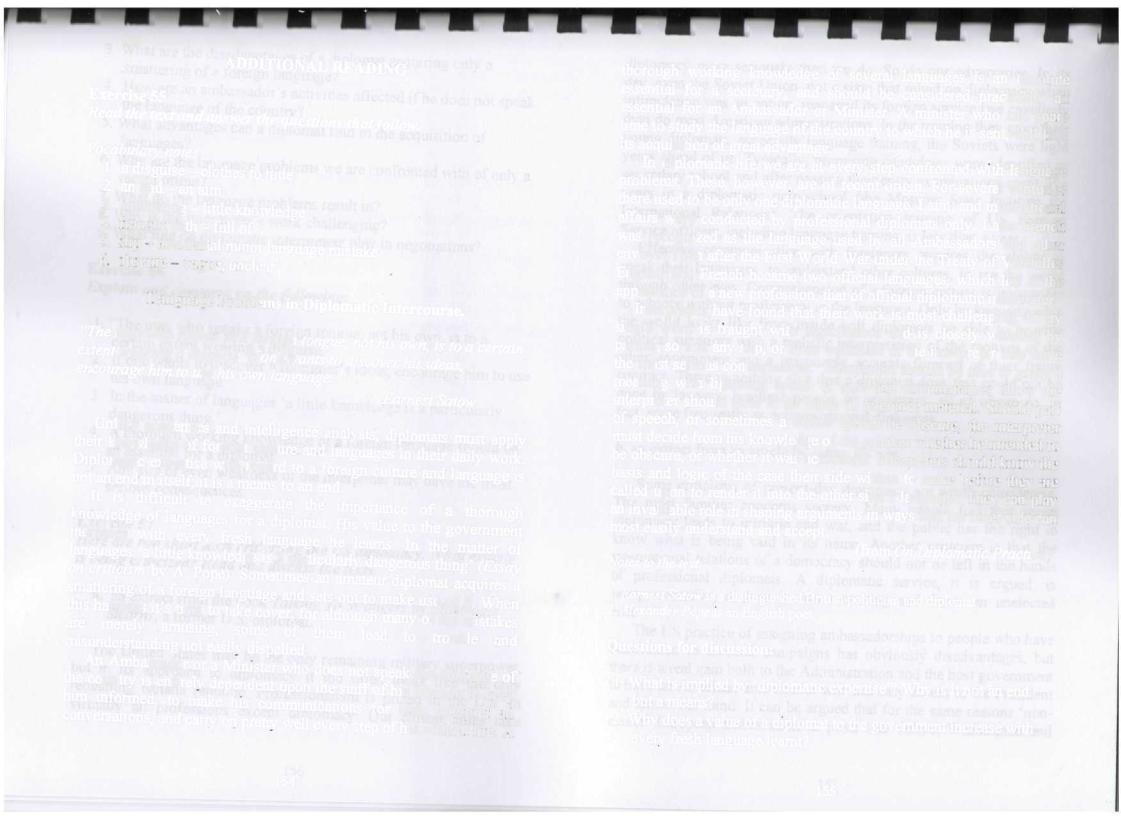
A D D I T I O N A L READING
Exercise 55
Read the text and answer the questions that follow.
Vocabulary notes
1.a disguise - clothes to hide
2.an end - an aim
3.smattering - little knowledge
4.frftught with - full of
5.slip - accidental minor language mistake 6 obscure vague, unclear
|
Language Problems in Diplomatic Intercourse . |
|
"The man |
who speaks in a foreign tongue, not his own, |
is to a certain |
extent wearing a disguise. If one wants to discover his ideas, |
||
encourage |
him to use his own language. " |
|
|
Earnest |
Satow. |
Unlike academics and intelligence analysts, diplomats must apply their knowledge of foreign culture and languages in their daily work. Diplomatic expertise with regard to a foreign culture and language is not an end in itself; it is a means to an end.
It is difficult to exaggerate the importance of a thorough knowledge of languages for a diplomat. His value to the government increases with every fresh language he learns. In the matter of languages ca little knowledge is a particularly dangerous thing' (Essay on criticism by A. Pope). Sometimes an amateur diplomat acquires a smattering of a foreign language and sets out to make use of it. When this happens it's time to take cover, for although many of his mistakes are merely amusing; some of them lead to trouble and misunderstanding not easily dispelled.
An Ambassador or a Minister who does not speak the language of the country is entirely dependent upon the staff of his mission to keep him informed, to make his communications for him, interpret all conversations, and carry on pretty well every step of his official life, A
154
thorough working knowledge of several languages is an absolute essential for a secretary, and should be considered practically an essential for an Ambassador or Minister. A minister who can spare time to study the language of the country to which he is sent, will find its acquisition of great advantage.
In diplomatic life we are at every step confronted with language problems. These, however, are of recent origin. For several centuries there used to be only one diplomatic language, Latin, and international affairs were conducted by professional diplomats only. Later French was recognized as the language used by all Ambassadors and other envoys. Then after the First World War under the Treaty of Versailles English and French became two official languages, which led to the appearance of a n e w profession, that of official diplomatic interpreter.
Interpreters have found that their work is most challenging. Every single word is fraught with significance and is closely watched by parties, so that any slip, or even weakness of the interpreter may have the most serious consequences. Interpreters should be able to grasp a meaning with lightning speed. If time and circumstances allow the interpreter should refer to all kinds of reference material. Should part of speech, or sometimes a whole speech be obscure, the interpreter
must decide from his knowledge of the speaker whether he intended |
to |
be obscure, or whether it was accidental. Interpreters should know |
the |
basis and logic of the case their side wishes to make before they are called upon to render it into the other side's language. They can play an invaluable role in shaping arguments in ways that the other side can most easily understand and accept.
(from On Diplomatic Practice)
Notes to the text:
1.Earnest Satow is a distinguished British politician and diplomat.
2.Alexander Pope is an English poet.
Questions for discussion:
1.What is implied by 'diplomatic expertise'? Why is it not an end but a means?
2.Why does a value of a diplomat to the government increase with every fresh language leamt?
155
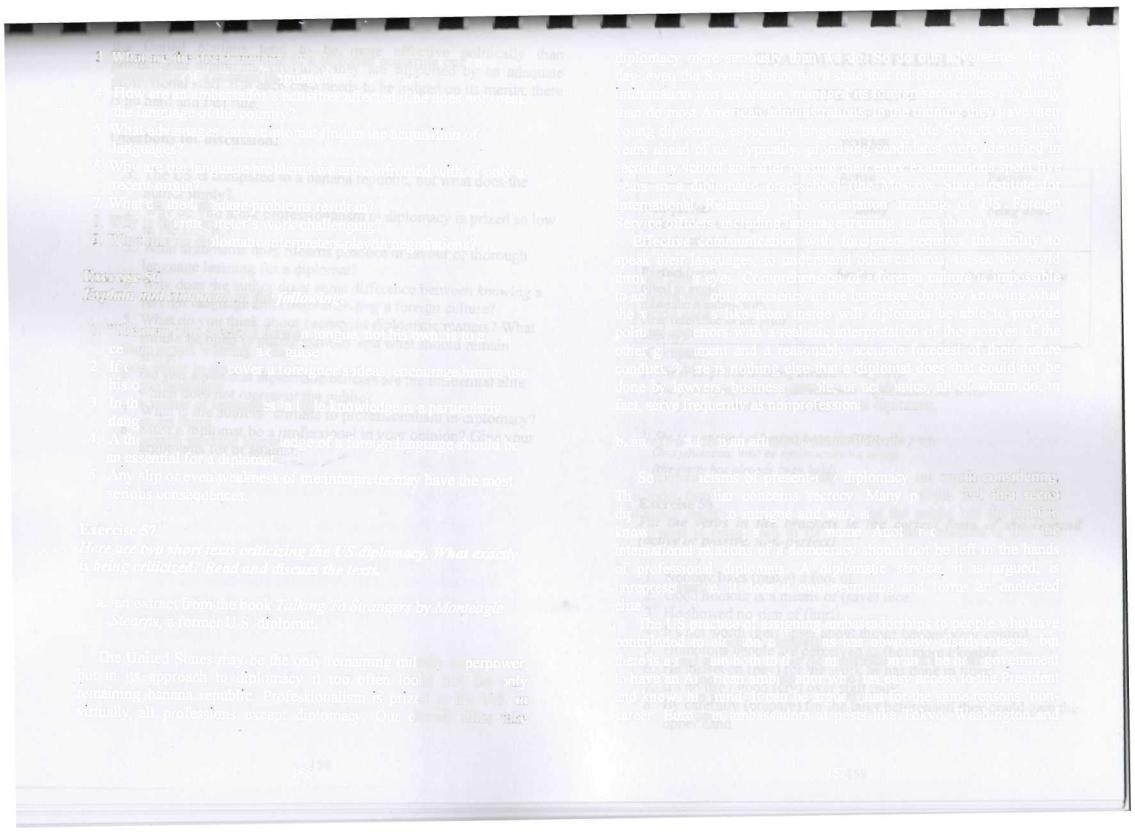
I, |
What are me disadvantages of a diplomat acquiring only a |
|
smattering of a foreign language? |
4. |
How are an ambassador's activities affected if he does not speak |
|
the language of the country? |
5.What advantages can a diplomat find in the acquisition of languages?
6.Why are the language problems we are confronted with of only a recent origin?
7.What do the language problems result in?
8.Why is the interpreter's work challenging?
l>. What role do diplomatic interpreters play in negotiations?
Exercise 56
Explain and comment on the following:
1.."The man who speaks a foreign tongue, not his own, is to a certain extent wearing a disguise."
2.If one wants to discover a foreigner's ideas, encourage him to use his own language.
3.In the matter of languages 'a little knowledge is a particularly dangerous thing.'
4.A thorough working knowledge of a foreign language should be an essential for a diplomat
5.Any slip or even weakness of the interpreter may have the most serious consequences.
Exercise 57 |
|
|
|
|
|
|
Here are |
two short |
texts |
criticizing the |
US |
diplomacy. |
Witat exactly |
is being |
criticized? |
Read |
and discuss |
the |
texts. |
|
a. an extract from the book Talking To Strangers by Monteagle Stearns, a former U.S. diplomat
The United States may be the only remaining military superpower, but in its approach to diplomacy it too often looks like the only remaining banana republic, Professionalism is prized in the U.S. in virtually all professions except diplomacy. Our closest allies take
diplomacy more seriously than we do. So do our adversaries. In its day, even the Soviet Union, not a state that relied on diplomacy when intimidation was an option, managed its foreign service less cavalierly than do most American administrations. In the training they gave their young diplomats, especially language training, the Soviets were light years ahead of us. Typically, promising candidates were identified in secondary school and after passing their entry examinations spent five years in a diplomatic prep-school (the Moscow7 State Institute for International Relations). The orientation training of US Foreign Service officers, including language training, is less than a year.
Effective communication with foreigners requires the ability to speak their languages, to understand other cultures, to see the world through other eyes. Comprehension of a foreign culture is impossible to achieve without proficiency in the language. Only by knowing what the world looks like from inside will diplomats be able to provide political superiors with a realistic interpretation of the motives of the other government and a reasonably accurate forecast of their future conduct. There is nothing else that a diplomat does that could not be done by lawyers, business people, or academics, all of whom do, in fact, serve frequently as nonprofessional diplomats.
b. an extract from an article by Adam Watson
Some criticisms of present-day diplomacy are worth considering
The most familiar concerns secrecy. Many people feel that secret
diplomacy leads to intrigue and war, and the public has the right to know what is being said in its name. Another criticism is that the international relations of a democracy should not be left in the hands of professional diplomats. A diplomatic service, it is argued, is unrepresentative, it does it own recruiting and forms an unelected elite.
The US practice of assigning ambassadorships to people who have contributed to election campaigns has obviously disadvantages, but there is a real gain both to the Administration and the host government to have an American ambassador who has easy access to the President and knows his mind. It can be argued that for the same reasons 'noncareer' European ambassadors at posts like Tokyo, Washington and
156 |
157 |
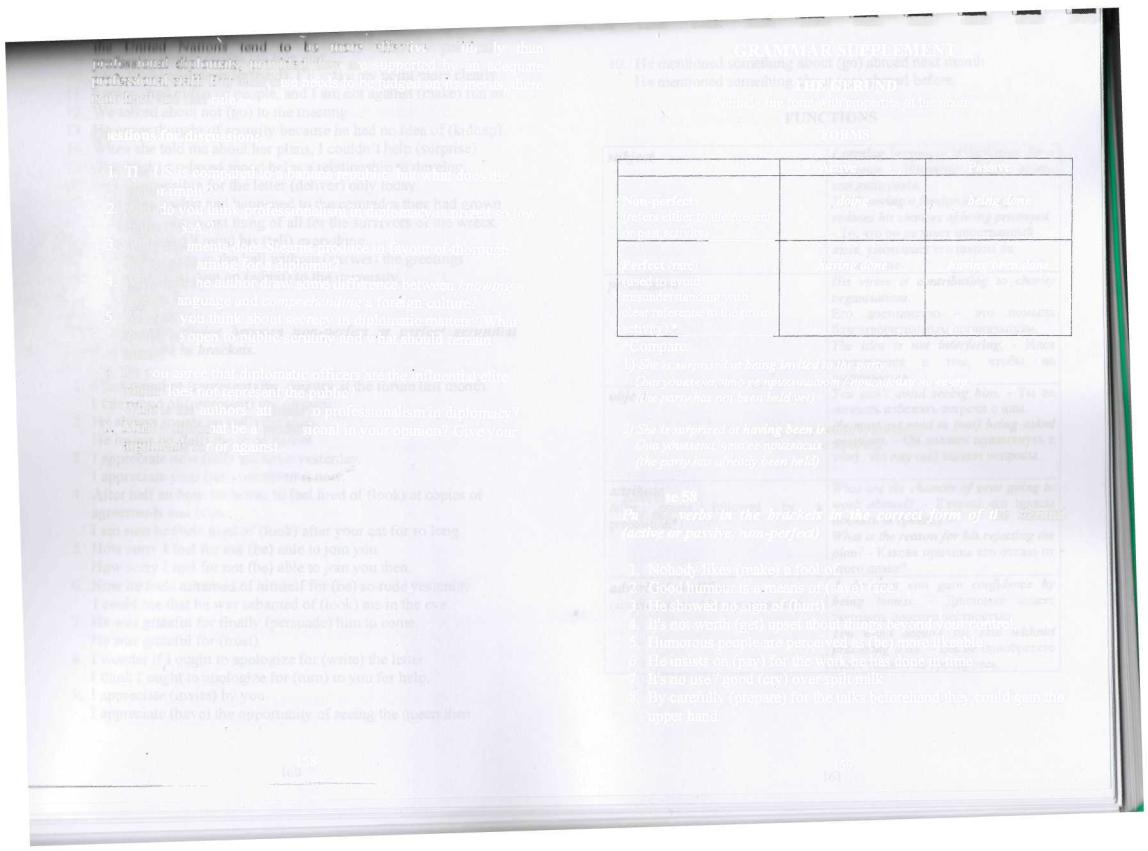
>г т о ю effective politically than |м,./г Mnn.'ii .iijiioiiKii.s, provided they are supported by an adequate pm/cssioiKil siiilT But each case needs to be judged on its merits, there is no hard and fast rule.
Questions for discussion:
1. The US is compared to a banana republic, but what does the author imply?
2.Why do you think professionalism in diplomacy is prized so low in the U.S.A.?
3.What arguments does Stearns produce in favour of thorough language learning for a diplomat?
4.Why does the author draw some difference between knowing a foreign language and comprehending a foreign culture?
5.What do you think about secrecy in diplomatic matters? What should be open to public scrutiny and what should remain secret?
6.Do you agree that diplomatic officers are the influential elite which does not represent the public?
7.What is the authors' attitude to professionalism in diplomacy?
8 Must a diplomat be a professional in your opinion? Give your arguments for or against
158
G R A M M A R S U P P L E M E N T
THE GERUND
(verbal - ing form with properties of the noun) FORMS
|
|
|
|
Active |
Passive |
j Non-perfect |
doing |
being done |
|||
I (refers either to the present |
|
|
|||
1 or past activity) |
|
|
|||
Perfect (rare) |
|
having done |
having been done |
||
(used to avoid |
|
|
|||
misunderstanding with |
|
|
|||
clear reference to the prior |
|
|
|||
activity) * |
|
|
|
|
|
^Compare:
1) She is surprised at being invited to the party.
Она удивлена, что ее приглашают /пригласили на вечер. (the party has not been held yet)
2) She is surprised at having been invited to the party. Она удивлена, что ее пригласили на вечер,
(the party has already been held)
Exercise 58 |
|
|
Pitt the |
verbs in |
the brackets in the correct form of the Gerund |
(active |
orpassivey |
non-perfect) |
1.Nobody likes (make) a fool of
2.Good humour is ameans of (save) face.
3.He showed no sign of (hurt).
4.It's not worth (get) upset about things beyond your control.
5.Humorous people are perceived as (be) more likeable.
6.He insists on (pay) for the work he has done in time.
7.It's no use / good (cry) over spilt milk.
8.By carefully (prepare) for the talks beforehand they could gain the upper hand.
159

10 Г am afraid of (misunderstand). I'll make my point more clearly.
11.1enjoy (make) fun of people, and I am not against (make) fun of.
12.We talked about not (go) to the meeting.
13.He never thought of security because he had no idea of (kidnap).
14.When she told me about her plans, I couldn't help (surprise).
15.(Establish) a relaxed mood helps a relationship to develop.
16.He is responsible for the letter (deliver) only today.
17.(Not know) what had happened to the comrades they had grown to love was the worst thing of all for the survivors of the wreck.
18.I hope you don't mind his (tell) everything.
19.He quickly went to the hall without (answer) the greetings.
20.I congratulated Ann on (admit) to the university.
Exercise 59
Make the right choice between non-perfect or perfect gerundial forms of the verb in brackets.
1.I feel proud of (represent) my country at the forum last month. I felt proud of (represent) my country.
2.He always insists on (tell) the truth. He insists on (tell) the truth before.
3.I appreciate now (tell) the news yesterday.
I appreciate your (tell) me about it now.
4.After half an hour he began to feel tired of (look) at copies of agreements and bills.
I am sure he feels tired of (look) after your cat for so long.
5.How sony I feel for not (be) able to join you.
How sony I feel for not (be) able to join you then.
6.Now he feels ashamed of himself for (be) so rude yesterday. I could see that he was ashamed of (look) me in the eye.
7.He was grateful for finally (persuade) him to come.
He was grateful for (trust).
8.I wonder if I ought to apologize for (write) the letter. I think I ought to apologize for (turn) to you for help.
9.I appreciate (invite) by you.
I appreciate (have) the opportunity of seeing the queen then.
10.He mentioned something about (go) abroad next month He mentioned something about (go) abroad before.
|
FUNCTIONS |
|
subject |
Learning languages is important for a |
|
|
diplomat |
- Изучение языков важно |
|
для дипломата. |
|
|
Not knowing a foreign language |
|
|
reduces his chances of being promoted. |
|
|
- To, что он не знает иностранный |
|
|
язык, уменьшает его шансы на |
|
|
повышение. |
|
predicative |
His virtue is contributing to charity |
|
|
organisations. |
|
|
Его достоинство - это помощь |
|
|
благотворительным организациям. |
|
|
The idea |
is not interfering. - Идея |
|
заключается в том, чтобы не |
|
|
вмешиваться. |
|
object |
You can 7 avoid seeing him. - Ты не |
|
|
можешь избежать встречи с ним. |
|
Не must get used to (not) being asked questions. - On должен [фИВЫХНуТЬ К
тому, что ему (ис) задают вопросы
attribute
(after nouns followed by a preposition*)
adverbial modifier
(always preceded by a preposition)
What are the chances of your going to work abroad? - Каковы его шансы
поехать за границу?
What is the reason for his rejecting the plan? - Какова причина его отказа от этого плана?
A diplomat can gain confidence by being honest. - Дипломат может завоевать доверие честностью.
You won't acquire the skill without practicing a lot. - Вы не приобретете этого умения не тренируясь.
160 |
161 |
|
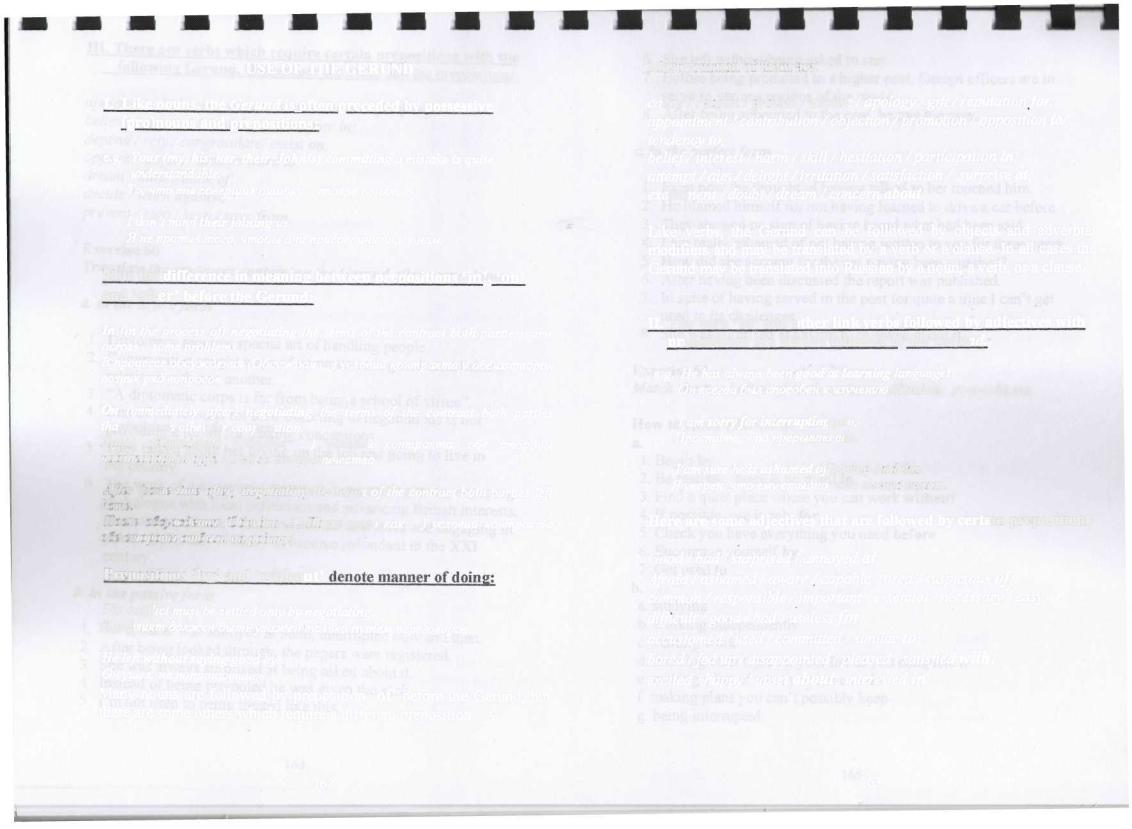
U SE O F T H E G E R U N D
I. Like nouns, the Gerund is_often preceded by possessive (pro)nouns and prepositions:
e.g. Your (my, his, her, their, John's) committing a mistake is quite understandable.
To, что ты совершил ошибку ~ вполне понятно.
I don 7 mind their joining us.
Я не против того, чтобы они присоединились к нам.
Note the difference in meanin g between prepositions 4 n % ' o n ' and ' a f t e r ' before the G e r u n d :
In (in the process of) negotiating the |
terms of the contract both parties came |
across some problems. |
|
В процессе обсуждения (Обсуждая |
...) условий контракта у обеих сторон |
возник ряд вопросов. |
|
On (immediately after) negotiating the terms of the contract both parties thanked each other for cooperation.
После обсуждения (Обсудив ...) условий контракта, обе стороны
поблагодарили друг друга за сотрудничество.
After (some time qfttr) negotiating the terms of the contract both parties left hi ш$
После <><><\\)/< <)ет/ч (Обсудив ..., После того как... ) условий контракта otn* стороны отбыли на родину.
Prepositions 4 b y ' and ' w i t h o u t '
The conflict must be settled only by negotiating.
Конфликт должен быть улажен только путем переговоров.
Не left without saying good bye. Он ушел, не попрощавшись.
Many nouns are followed by preposition ' o f before the Gerund, but there are some others which require a different preposition.
Most common of (hem are:
cause |
/reason |
/ground/excuse |
/apology |
/gift/reputation |
for; |
|||||
appointment/contribution |
/objection/promotion |
/opposition |
to/ |
|||||||
tendency |
to; |
|
|
|
|
|
|
|
|
|
belief/ |
interest / |
harm / |
skill |
/ hesitation /participation |
in; |
|
||||
attempt/aim /delight /irritation |
/satisfaction |
/ |
surprise |
at; |
|
|||||
excitement |
/doubt/dream |
/concern |
about |
|
|
|
|
|||
Like verbs, the Gerund can be followed by objects and adverbial modifiers and may be translated by a verb or a clause. In all cases the Gerund may be translated into Russian by a noun, a verb, or a clause.
П. The verb 'be' and other link verbs followed by adjectives with prepositions are always followed by the Gerund.
e.g. He has always been good at learning languages.
Он всегда был способен к изучению языков.
I am sorry for interrupting you. Простите, что прерываю вас.
I am sure he is ashamed of having said this.
Я уверен, что ему стыдно, что он это сказал.
Here ar e some adjectives tha t are followed by certain preposition!
Good / |
|
bad |
/ surprised / annoyed |
at; |
|
|
|
|||||
Afraid/ashamed/ |
aware |
/capable |
/ |
tired/suspicious |
of; |
|||||||
common |
/ responsible |
/ |
important / essential / necessary / easy / |
|||||||||
difficult |
/ good |
/ |
bad |
/ |
useless for; |
|
|
|
|
|||
accustomed/ |
|
used/committed/similar |
|
to; |
|
|||||||
bored |
/fed |
up |
/ |
disappointed |
/pleased |
/ |
satisfied with; |
|
||||
excited |
/ happy |
/ |
upset |
about; |
interested |
in |
|
|||||
162 |
163 |
